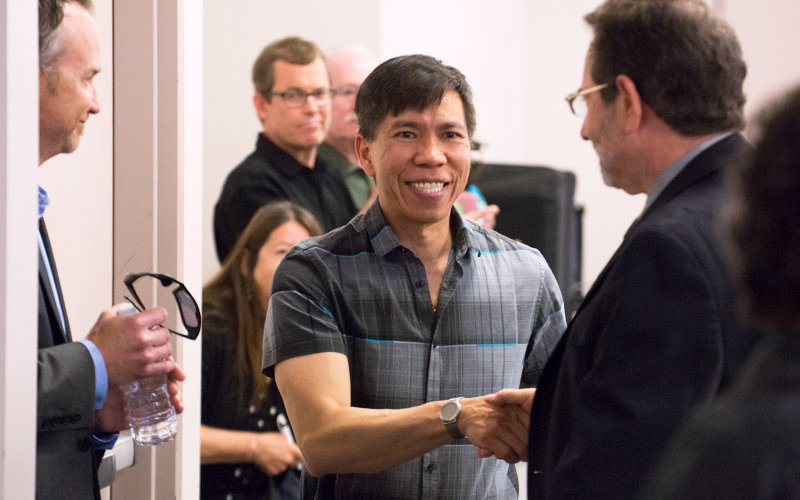
Neuroscientist Math P. Cuajungco is known for his impressive record of scholarship and creative ideas that led to an unexpected research discovery.
Since joining Cal State Fullerton in 2007, the researcher with an international reputation has established himself as an expert in the area of zinc neurobiology and neurodegenerative diseases, including Alzheimer’s disease, Parkinson’s disease and Mucolipidosis type IV.
Cuajungco’s research focuses on better understanding Mucolipidosis type IV, known as ML-IV, a genetic disorder that results in the death of cells in the brain, eye and stomach. His work led to a discovery that high amounts of zinc accumulate in certain cells, causing neurodegenerative diseases.
For his groundbreaking contributions to science and scholarly accomplishments, Cuajungco has been selected as the university’s 2018 recipient of the L. Donald Shields Excellence in Scholarship and Creativity Award.
CSUF President Fram Virjee noted that the award’s namesake, who served as the university’s second president from 1970-80, was committed to excellence in scholarship and was appointed to the National Science Foundation’s board. Shields, professor emeritus of chemistry, was the first representative of a non-Ph.D. granting institution.
“Those are big shoes to fill, but this year’s honoree clearly fills those shoes,” Virjee said of Cuajungco, who received the award at the May 10 Academic Senate meeting.
Coaxed to the meeting by his dean who told him he might be asked questions about the National Institutes of Health-funded Maximizing Access to Research Careers program, of which he serves as coordinator, Cuajungco was surprised by the recognition.
“I’m honored to be recognized for my research accomplishments,” said Cuajungco, professor of biological science. “More importantly, I am very grateful to my former and current students for helping me advance to where I am now. I also thank my colleagues and collaborators for their direct or indirect support of my academic endeavors.”
Sean Walker, chair and professor of biological science, called Cuajungco an invaluable colleague who is a strong contributor to the scholarly community.
“Dr. Cuajungco has contributed to the growth and development of federally funded research training programs, which give CSUF faculty and students greater opportunities to collaborate and engage in high quality, cutting-edge research experiences,” Walker said.
H. Jochen Schenk, professor of biological science, who nominated Cuajungco for the award, also noted his “record of outstanding scholarship at CSUF” and especially praised his “record of training and preparing students for success in research careers.”
In order to better understand ML-IV, Cuajungco has received nearly $1 million in research grants from the National Institutes of Health and National Science Foundation.
Cuajungco has published more than 40 peer-reviewed papers, including 16 in the last 10 years at CSUF — with many co-authored by his students — including a review paper in Frontiers in Bioscience last spring outlining his discovery.
Cuajungco also collaborates with CSUF colleagues on research projects. Over the last five years, he and his collaborators have collectively received a total of more than $6.7 million in external funding for scientific faculty-student research projects. Of these projects is a $1 million NIH-funded “big data” grant to train diverse students majoring in biological science, mathematics and health science.
He also has worked with colleague Maria Linder, professor of chemistry and biochemistry, and the inaugural Shields Award recipient, on her pioneering research to investigate copper metabolism in human cells.
“I see Math as an outstanding example of the ideal researcher, teacher and scholar,” Linder said in her support of his nomination for the award.
While over the past decade Cuajungco has sustained an impressive record of scholarship, he also is committed to mentoring the next generation of scientists. Under his direction, more than 50 undergraduates and graduate students have conducted neurodegenerative disease research, with many winning local and national research awards and pursuing doctorates.
Former student Mohammad Samie ’09 (M.S. biology), who earned a doctorate from the University of Michigan, attests to his faculty mentor’s support to budding scientists.
“Dr. Cuajungco’s passion for science, enthusiasm, integral views on research, and his mission for providing high quality work, made a deep impression on me,” said Samie, a scientist at a leading biotechnology company.
“His mentoring style promotes creative thinking and he does a great job of guiding his students through the ups and downs of research. He demands excellent work ethics from his lab members — and he certainly leads by example.”